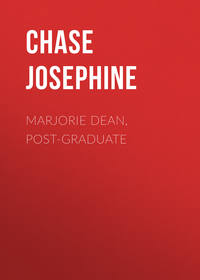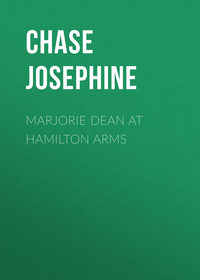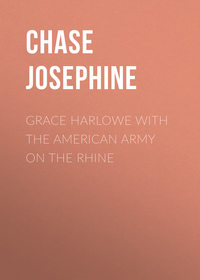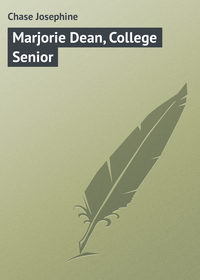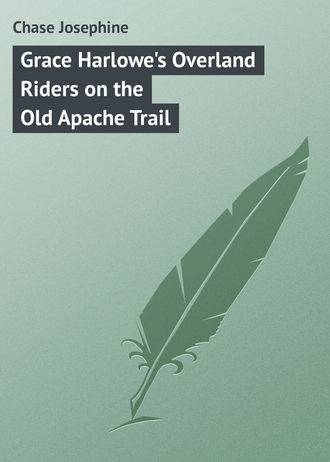 полная версия
полная версияGrace Harlowe's Overland Riders on the Old Apache Trail
“We are and we shall,” answered Grace.
“Then I think those of you who have property had better make your wills before embarking. Nora, this applies especially to you and Hippy who so recently have come into a fortune. Grace made her will before going overseas to drive an ambulance on the French front, but Emma, having spent all her money on finery, had no need to make a will.”
“How about yourself?” questioned Grace teasingly.
“I am merely a struggling young lawyeress who isn’t supposed to have money to will, and who most assuredly has no clients to pay her any. Isn’t it about time for luncheon?”
Grace said it was, but that they were waiting for Hippy so that all might sit down together.
Lieutenant Wingate came in shortly after that, covered with dirt, and a beauty spot on one cheek.
“You are a sight, Hippy Wingate,” chided Grace. “How did you get yourself in such a condition?”
“Helping the man grease the wagon.”
“You go right up to our room and make yourself fit to sit down with civilized persons,” ordered Nora. “I am ashamed to own you as my husband.”
“Isn’t that a fine way to order around a fellow who has fought the Boche on high, and who will go down in history as a brave air fighter?” teased Anne.
“Some husbands have to be ordered. Mine is one of them,” answered Nora, giving Hippy’s ear a tweak. “Now run along, little man.”
Hippy kissed Nora and ran upstairs laughing to himself. Nora’s scolding did not even penetrate skin deep with Lieutenant Wingate, nor did she intend that it should.
Soon after that the Overton College girls filed into the dining room where a number of tourists were having luncheon. The girls, in their overseas uniforms, attracted attention at once, many of the guests having been told who the young women, with the tanned faces and familiar uniforms, were. The guests also had been informed that the man with the party was Lieutenant Wingate, a noted American air fighter who stood high up in the list of those who had downed more than twenty enemy planes.
As she took her seat at the table, Grace bowed smilingly to two ladies who had come in on the train with them that morning.
“Girls, what shall we eat?” she asked.
“Speaking for myself as a modest person, I think I shall begin at the top of the menu and eat my way all the way down to the bottom,” observed Hippy solemnly amid the laughter of the others.
Luncheon finished, the party went out sight-seeing, and for a look at the ponies that Hippy had hired for the trip over the Old Apache Trail, on which journey they would have started on the following morning had Grace not chanced to discover the old Deadwood stagecoach.
At three o’clock that afternoon the party of Overton girls loaded their belongings, such as would be needed for a twenty-four hour jaunt, into an automobile, and drove to the stable where the stage driver, Ike Fairweather by name, was preparing to harness up the four horses that were to draw the coach.
Hippy removed his coat and assisted in the operations, while the girls inspected the stagecoach and stowed away their belongings.
Emma’s nose went up ever so little when she peered into the interior of the vehicle, observing the old rickety wooden seats, the tattered curtains and the cracks in the warped flooring.
“If this old ark lasts until we get out of town, I am no prophet,” she declared. “What if it breaks down?”
“We can walk, just as some of us have had to do in France when an ambulance went out of commission,” answered Grace laughingly. She then placed blankets on the hardwood seats and packed their provisions underneath.
By this time Ike was hooking up the four horses. That he was an experienced man Grace saw after observing him critically for a few moments, and she was certain that they could safely trust themselves to his driving.
“I have a lurking idea that the girls of this outfit are in for a ride that they will not soon forget, even though things look favorable,” she thought, smiling to herself.
“Grace Harlowe, what are you laughing at?” demanded Anne.
“I was thinking of something very, very funny,” replied Grace.
“Let me in on the joke, please,” begged Emma.
“Not now. Perhaps later on.”
Elfreda regarded her frowningly.
“If you play any tricks on us, Loyalheart, you will be sorry,” warned Miss Briggs.
“How can you even suggest such a thing?” cried Grace. “Did you ever know me to play pranks on my friends?”
“There have been occasions when suspicions assumed real shapes in my mind,” retorted Elfreda.
“See to it that this is not one of those occasions. I believe we are about ready to make our start. Mr. Fairweather, where is there a good place for us to make camp to-night? I do not think we should try to make the Lodge this evening. All we desire is to take the coach into the mountains, make camp, and come back in the early morning. It doesn’t matter whether or not we go so far as the Lodge.”
“Squaw Valley or just beyond I reckon is as good as any place on the trail,” observed the driver, reflectively stroking his whiskers.
“How far is that from here – I mean Squaw Valley?”
“Nigh onto thirty mile, I reckon.”
“That, I think, will be about as much of a trip as my companions can stand, so we will say Squaw Valley, or the next available point. I leave the selection of the camping place to your judgment. What time do you think we shall reach the Valley?”
“’Bout ten o’clock. Have to go slow when we get into the hills, an’ we bump ’em right smart after leavin’ Globe. Sharp turns and narrow trail in spots, but it ain’t much like the days when I driv a coach an’ four in the hills an’ carried the mail an’ kep’ a weather eye out for bandits. Since then them buzz wagons has took all the starch out of livin’. Ever drive one?”
“I drove an ambulance at the front for nearly a year of the war,” answered Grace quietly.
“You don’t say?” Ike regarded the slender figure of the young Overton girl, his gaze finally coming to rest on her well-tanned face. “Come to look you over, you’ve got a mighty steady eye an’ a good jaw. I’ve seen thet kind before an’ sometimes behind a gun. Thet kind is fine till you get them riled, then look out for the lightnin’. Where you goin’ to ride?”
“Outside with you until we reach Squaw Valley, if I may,” answered Grace smilingly.
“Glad to have you. All aboard thet’s goin’!”
“Please get in with the girls, Hippy. Later on you and I will change seats, if that will suit you,” said Grace.
The lieutenant stood aside until the four girls were safely stowed away in the stagecoach, Grace, in the meantime, having swung herself up to the front seat with the driver. The door slammed, Ike cracked his whip, and the coach started with a jolt that brought strong protest from the passengers down below.
“Hey there, you!” shouted Hippy, thrusting his head out. “I haven’t got my safety belt on, so don’t take off like that again or you will throw me out.”
“Hang on, Lieutenant!” urged Grace, her laughing eyes peering over the edge of the coach into the red, perspiring face of Hippy Wingate. “That is the way I had to do when I went flying with you in France. If you will recall, you said yesterday that you must have excitement. I am simply providing it for you, and I have an idea you will get all you wish by the time we have done with this journey.”
The lieutenant drew in his head and they heard nothing more from him for some time.
The Deadwood stagecoach swept out with a rattle and a clatter and a groaning in every joint, that aroused the apprehension, not only of its passengers, but of persons on the streets who paused to see the outfit wheel past them, the four horses at a brisk trot.
Leaving the town quickly behind them, the stagecoach swept out into the open. The smoke of the Old Dominion and Inquisition smelting furnaces hung gray against the sky, but the Overton girls were soon past the tall black buildings of cooling copper, riding away toward the west at a pace that caused the stagecoach to complain even more bitterly than before.
It was to be a mere outing, a jaunt in an historic old stagecoach, over an equally historic trail, but that was all, so far as Grace Harlowe and her friends had planned it. What the “jaunt” developed into was an exciting adventure, which had in it all the elements of a real tragedy. Grace already was glorying in the fresh air, the roll of the vehicle under her, and the uncertainty of what the next moment held for her.
“Will our wagon stand a lively run down the grade?” she questioned, as they topped a rise and she saw a stretch of about half a mile of trail falling away and disappearing in the valley below them.
“I reckon it will,” grinned the driver.
“How about the horses?”
“Thet’s all right. Don’t you worry ’bout the nags, Miss.”
“Then shake them out. Let’s stir up those people in the coach and show them what riding in a Deadwood stagecoach really means,” eagerly urged Grace Harlowe.
Ike did. He gave the reins a shake and cracked the long-lashed whip that sounded to Grace like the report of a pistol.
The horses responded instantly, starting down the steep grade at a lively gallop, accompanied by encouraging yelps from Ike Fairweather.
“Thet’s the way we driv when we thought the Redskins was after us,” he called to Grace without turning his head.
Twenty seconds later the coach was rolling like a ship in a heavy sea, accompanied by a medley of shrieks and shouts of protest from the jumbled cargo of passengers inside.
“Faster! Faster, Mr. Fairweather,” urged Grace.
Ike’s yelps grew louder and closer together, and the gallop of the four-horse team became a run. About this time the occupants on the inside of the coach, having reached the limit of their endurance, registered a violent protest.
CHAPTER III
A THRILLING HALT
“HI, up there! Cut the gun!” bellowed the voice of Hippy Wingate, using an aviator’s term for shutting off the power. “Stop it, I say! You will have us all in the ditch!”
Grace grinned at Ike and Ike grinned at his team. Neither made any reply to Hippy’s wail of distress. Grace’s hat was now off, her hair was blowing in the wind, and her eyes were snapping.
“Oh, that was glorious, Mr. Fairweather,” she cried as the stagecoach reached the bottom of the grade and lurched around a sharp curve on two wheels, a proceeding that brought another series of shrieks from the occupants of the coach.
Hippy was still protesting and threatening, then suddenly Grace and Ike were startled at hearing the lieutenant’s voice close behind them, right at their ears, it seemed.
Grace turned and found herself looking into the flushed face of Hippy Wingate whose head and shoulders were above the top of the coach. He was standing on the window sill of the door and clinging to the edge of the roof of the stagecoach.
“Get down, Hippy! You will be thrown off and hurt,” begged Grace.
“I can’t be any worse injured than I am now after being played football with inside of this old box. What’s the matter? Isn’t there a brake on this bundle of junk?”
“I don’t know. Sorry, but I thought you might enjoy a few sideslips to remind you of France. Please stop, Mr. Fairweather. He will break his neck if he tries to get down while we are in motion.”
Ike applied the brake and pulled up the horses, whereupon Hippy sprang down to the trail and swung aboard again.
“If you do that again I’ll walk,” was his parting threat.
“How’d you like it, Miss?” grinned the driver.
“Splendid! I have not had such an exciting ride since one time when I was racing with my ambulance in France to clear a cross-roads ahead of a shell that was on the way there,” declared Grace.
“I was goin’ to ask you ’bout the war. You must have seen some big ones – big shells?”
“Many of them.”
“Never got hit, did you!”
“I was wounded three times.”
“You don’t say!” Ike gazed at her with new interest. “Was he in the war, too?” referring to Hippy.
“Yes, as an aviator, and fought many battles in the air. All the young women who are with us on this drive also saw service in the war zone in France. They were a part of the Overton College Unit that went overseas for the Red Cross.”
“Must have been purty bad business, thet.”
“It was, but I would not have missed it for anything. Did many men from your city go to the war?”
Ike nodded.
“Some didn’t come back, neither. S’pose your ambulance got hit once, anyway?”
“I lost four cars during the time I was driving. Two were blown up and the others were wrecked in accidents,” Grace informed her companion on the driver’s seat. “My husband is still in the service. He is now in Russia where he was sent after the armistice was signed.”
“Your husband? You don’t say! I wouldn’t think it. Why, you don’t look like more’n a school girl. I’ll bet he’d like to be here right this minute.”
“And I’ll bet I should like to have him here, too,” answered Grace smilingly. “Do you think we shall be able to stir up any excitement on the trail? We propose to do the entire journey on our ponies, you know, starting the day after to-morrow.”
“Mebby, mebby,” reflected Ike.
“Are there any Apaches left in the mountains?” questioned Grace.
“Yes. Too many of ’em.”
“Friendly?”
“Sometimes when they want to beg or steal somethin’ from you. Don’t trust ’em, Miss. An Indian’s an Indian, ’specially when he’s an Apache. They’d do a heap lot more than they do if they dared. Can you shoot?”
“Some,” admitted Grace.
“I’ll bet you’re a dead shot. If them eyes was behind a gun thet was pinted at me, I’d put up my hands without bein’ asked a second time.”
“Were you ever held up by bandits?” asked Grace, eager to get the old stagecoach driver started talking of his experiences.
“Regular thing in the old days.”
“What did you do in those emergencies?”
“Ginerally put up my paws when I was invited to. Such fellows can shoot and most always does.”
“But, Mr. Fairweather, did your passengers never venture to defend themselves!”
“Once a man did. He’s down there now, near where we’re goin’ to stop for chuck – in Squaw Valley.”
“He was not quick enough! Is that it, sir!”
“You said it. Was the Germans quick on the trigger?”
“Their sharpshooters were very quick. Good shots, too, all of them, but our sharpshooters could beat them at stalking. You know our boys like to fight Indian style, while the German fights by rule and orders.”
The driver nodded his understanding, and began admonishing the off-wheel horse who was using his heels rather too freely.
“Thet critter would run away if I give him half a show,” grinned Ike.
“Of course if he were to do that and turn the coach over, you could not help yourself, could you, Mr. Fairweather?” questioned Grace innocently.
Ike gave her a quick sidelong glance, but Grace Harlowe’s face was guileless.
“I b’lieve you’d like to have him run away,” he chuckled.
“Oh, no, nothing like that, sir. My friends might get hurt. Otherwise, I should not mind it at all.”
“You shore are a queer one,” muttered Ike. “Over beyond the rise you see ahead is Squaw Valley. Good water there and fine place to have chuck. How much further do you reckon on goin’?”
“I was about to suggest that you decide that. If we ride until ten o’clock it will be late enough. I imagine, too, that our friends in the coach will have had enough of it by then. After leaving the Valley, if we decide to go further, I will go inside, giving Lieutenant Wingate an opportunity to ride outside with you. Perhaps you may be able to induce him to tell you how he fought the Huns above the clouds. I know you will enjoy hearing of it from a man who has fought that way.”
“Shore, I would. Never was a prisoner over there, was you?” asked Ike.
“Yes, the Boches got me once and sent me to a prison camp, but I made my escape. They came near getting me twice after that.”
“Huh! Got a family?” Ike was determined to get all the information he could. He had been doing it for years from the passengers who rode with him on top of the stage.
“If you mean children, I have a daughter, an adopted French girl. I found her in a deserted French village one night, the village at the time being under heavy artillery fire. I adopted the little one later, and she is now at school back east. Isn’t that Squaw Valley?” asked Grace, pointing.
“Thet’s her.”
A few moments later the stagecoach drew out to one side of the trail and stopped.
“All out for mess,” cried Grace, springing to the ground. “How do you folks feel after that delightful ride?”
“Ride, did you call it?” demanded Hippy Wingate, getting out laboriously and limping about to take the kinks out of his legs. “It’s worse than hitting one of those bumpy white clouds with an airplane.”
“Grace Harlowe, I believe you gave us that shaking up on purpose,” accused Elfreda Briggs.
The others voiced their protests in no uncertain manner.
“You will forget all about it after we have made tea and cooked our bacon,” comforted Grace, neither admitting nor denying the accusation. “There is nothing like a good shaking up to accelerate one’s appetite.”
Under Grace Harlowe’s skillful hands a little fire was soon flickering beside the trail, the driver eyeing the blaze with approval; then the Overton girls got briskly to work preparing the supper.
“Where’d you learn to make an Indian cook-fire?” demanded Ike.
“My husband taught me. He is a forester, you know,” replied Grace.
“Know how to make a lean-to?”
“Oh, yes, sir.”
“You’ll do. No tenderfoot ’bout you. Reckon I’ll fetch water for the folks and horses now.”
The party ate sitting on the ground, Ike’s interest during the meal being divided between Grace Harlowe and Lieutenant Wingate. They were the first real heroes that he had ever known, and he proposed to make the most of his opportunity.
“Well, Mr. Fairweather, shall we go on?” asked Grace after they had finished the meal.
“Reckon so. Better camping ground further on.”
Equipment was quickly packed away and Ike hooked up for the start, but before leaving, Hippy Wingate and Elfreda issued a solemn warning that there was to be no more speeding.
The night, now upon them, was moonless, but the stars shed a faint light on the trail causing it to stand out dimly for a short distance ahead of them, save here and there, where overhanging rocks threw it into a deep shadow. It was an ideal night for traveling, cool but invigorating, with the breath of mountain and canyon heavy on the still evening air.
Lieutenant Wingate was riding with the driver, Grace now being inside the coach with the other girls. To protect themselves from the chill mountain air, Elfreda, Anne, Emma and Nora had wrapped themselves in blankets and were dozing off to sleep.
Grace was not sleepy, though the slow movement of the stagecoach as the horses climbed the steep grade was monotonous. She was too keenly alive to the wonders of the mountains to think of sleep, anyway. Grace leaned well out, with head down, watching the white trail that had echoed to the scuff of the moccasin of the savage redmen so many times in the past, and that was slipping slowly from under her, now and then gazing ahead along the narrow way with wondering eyes. The distant conversation of Lieutenant Wingate and Ike Fairweather drifted down in undistinguishable murmurs.
“Hippy is filling Ike with war stories, and he is drawing the long bow too, I’ll venture to say. What’s that?” Grace drew a sharp breath and her heart gave a thump.
The Overton girl thought she had seen a figure dart to the side of the road and into the shadow of the rocks as the coach swung around a sharp bend on the mountain trail.
“Yes, there is another! Something is going on here!”
Grace opened the coach door on the opposite side. There was a long, sloping bank on that side, the right side, leading down, she did not know how far, for the bottom was in deep shadow.
“Perhaps there are Indians on the trail,” muttered Grace, slipping out to the trail, and closing the coach door behind her as she trotted along beside the slowly moving stagecoach. She then hopped to the step where she crouched, clinging to the door frame with one hand. Grace could still hear Hippy and Ike Fairweather speaking, and so interested were they in their conversation that they failed to see what Grace Harlowe’s keen eyes had discovered.
“After all, what I saw may be simply prowlers,” reflected Grace, though her intuition told her that the figures she had discovered on the trail ahead meant something more than mere prowling.
Grace Harlowe’s intuition, in this instance, was not at fault.
Two rifle reports close at hand broke the mountain stillness, and the coach stopped with a sudden jolt as Ike Fairweather brought his horses to their haunches, so quickly did he pull them up.
A cry, which Grace recognized as having been uttered by Emma Dean, was heard in the coach.
“Flat down on the floor, every one of you, and not another sound!” commanded Grace in a low voice, dropping on all fours to the trail, and in that position crawling under the coach on hands and feet.
Before ducking under, a quick upward glance had shown Grace that Lieutenant Wingate’s hands were thrust above his head, and that Ike Fairweather was holding his as high as possible.
“All out, and keep your hands above your heads!” commanded a stern voice on the mountain side of the coach. “Quick!”
Grace Harlowe unlimbered her little automatic revolver from its holster under her blouse, the weapon that she had carried through the war.
Four frightened girls, crouching on the floor of the Deadwood coach, had not uttered a sound since the command to step out was uttered, nor had they made a movement to obey that command.
“Come out of that on the jump!” ordered the same stern voice that Grace had first heard, but this time in a new and more menacing tone.
A pair of booted legs appeared before Grace at the side of the coach, and she heard the coach door jerked open, followed by a scream from Emma.
Without an instant’s hesitation, Grace thrust her revolver forward until its muzzle was close to one of the booted legs, and pulled the trigger.
CHAPTER IV
THE BATTLE WITH THE BANDITS
THE highwayman uttered a yell, and leaped clear of the ground, dropping his rifle, which clattered to the trail within easy reach of the Overton girl’s hand.
Bang! Bang!
Two rifle bullets ripped through the roof of the old stagecoach.
“The cowards!” fumed Grace under her breath.
Snatching up the rifle that the highwayman had dropped, she crawled out from under the coach, and ran around behind it just as two more bandit shots rang out.
Grace threw the rifle to her shoulder and fired at a shadowy figure that she could barely see, and, in the next second, Lieutenant Wingate’s heavy army revolver cracked spitefully from the front seat of the coach. With Grace Harlowe’s first shot Hippy had unlimbered, and his revolver was now banging away to good purpose, as Grace realized when she heard another yell of pain.
“Look out, Grace, I’m coming!” warned Hippy as he leaped from the top of the coach to the trail.
“Disarm this fellow, please! He is wounded only in the leg, and he’s dangerous. I will take care of the others while you are doing that,” said Grace, starting to creep forward with rifle ready to fire.
Bang!
A revolver flashed from behind a jutting shelf of rock.
Bang!
The rifle in Grace Harlowe’s hands answered the revolver shot. She heard her bullet smack against the shale rock and pieces of stone patter on the trail.
“Ouch!” grunted the bandit who had fired at her.
Grace was certain that she had not hit the man, but she believed that a splinter of rock had accomplished what her bullet had missed doing.
While all of this was going on, Hippy was removing the weapons from the bandit through whose leg Grace had fired a bullet from her automatic revolver.
The Overton girl was still cautiously creeping forward.
“If any of you highwaymen fires another shot it will be your last,” she warned.
“Look out, Mrs. Gray! I reckon there’s another of them critters behind thet pint of rock,” drawled the calm voice of Ike Fairweather, who sat holding his horses, observing the fight with fascinated eyes. Ike, eager as he was to get into the fight, dared not leave his team, knowing that, if he did so, they would promptly run away with the coach and outfit.


